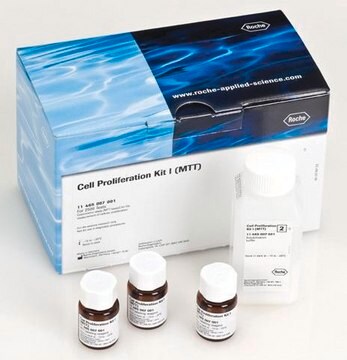402OA-05A
Human Chondrocytes - Osteoarthritis: HC-OA, adult
Synonyme(s) :
HC-OA cells
About This Item
Produits recommandés
Source biologique
human articular cartilage (osteoarthritic)
Niveau de qualité
Conditionnement
pkg of 500,000 cells
Fabricant/nom de marque
Cell Applications, Inc
Mode de croissance
Adherent
Caryotype
2n = 46
Morphologie
chondrocyte
Technique(s)
cell culture | mammalian: suitable
Maladie(s) pertinente(s)
arthritis
Conditions d'expédition
dry ice
Température de stockage
−196°C
Catégories apparentées
Description générale
HC-OA Human Chondrocytes are derived from human articular cartilage of donors with osteoarthritis (OA). Osteoarthritis is an inflammatory disease characterized by increased degradation of cartilage tissue in the joint due to overproduction of enzymes degrading the extracellular matrix. Despite the initial proliferation and activation of chondrocytes, they are not able to efficiently repair the degrading cartilage. Instead, chondrocytes undergo terminal differentiation and eventually apoptose, leading to mineralization of cartilage in a process resembling bone formation during development. Thus, HC-OA provide a useful model to study changes in chondrocyte biology in response to abnormal environment of the OA joint.
Characterization: Positive for aggrecan after differentiation.
HC-OA have been used to demonstrate that THF-alpha activates transcription of ADAMTS-4, a metalloproteinase implicated in cartilage degradation in OA, via p38-MAPK-dependent mechanism (Xue, 2013).
Origine de la lignée cellulaire
Application
Composants
Notes préparatoires
- 1st passage, >500,000 cells in Basal Medium containing 10% FBS & 10% DMSO
- Can be cultured at least 10 doublings
Procédure de repiquage
Clause de non-responsabilité
Code de la classe de stockage
11 - Combustible Solids
Classe de danger pour l'eau (WGK)
WGK 3
Point d'éclair (°F)
Not applicable
Point d'éclair (°C)
Not applicable
Certificats d'analyse (COA)
Recherchez un Certificats d'analyse (COA) en saisissant le numéro de lot du produit. Les numéros de lot figurent sur l'étiquette du produit après les mots "Lot" ou "Batch".
Déjà en possession de ce produit ?
Retrouvez la documentation relative aux produits que vous avez récemment achetés dans la Bibliothèque de documents.
Protocoles
Store the cryovials in a liquid nitrogen storage tank immediately upon arrival.
Notre équipe de scientifiques dispose d'une expérience dans tous les secteurs de la recherche, notamment en sciences de la vie, science des matériaux, synthèse chimique, chromatographie, analyse et dans de nombreux autres domaines..
Contacter notre Service technique







